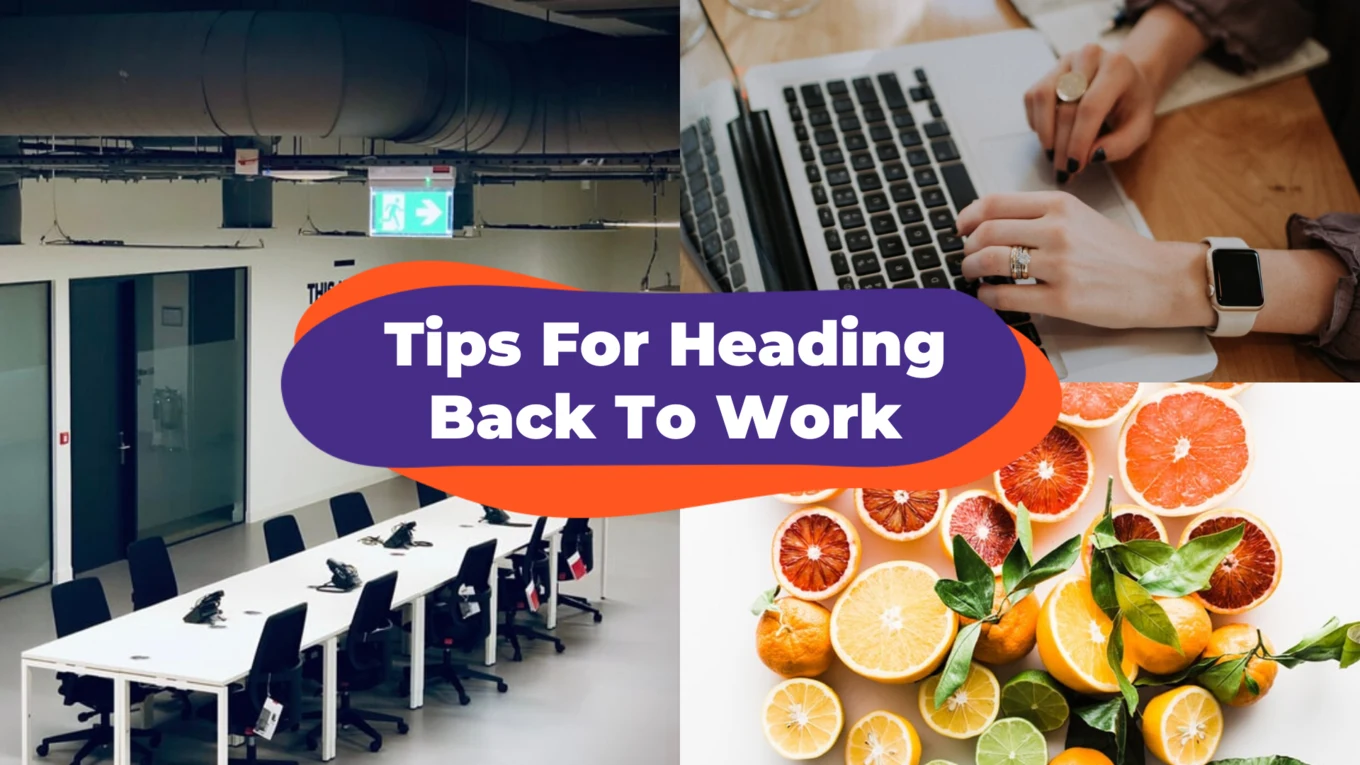Heading Back To Work?
As the MCO phased into CMCO and now the Recovery MCO, approximately 70% of Malaysians have returned to work, and the number is expected to increase gradually until daily life returns to how it was in the next few months. What are some things for you to take note of when returning to work amidst the COVID-19 pandemic? We've compiled a list of well-known as well as lesser-known tips for you to keep in mind as you prep yourself for returning to your workplace.
Stay Alert And Stay Healthy
1. Keep your distance
This is probably the most common yet most important tip. We trust that you guys already know the drill, but it's still important for us to emphasize this. Keep a safe distance of at least 2 metres from others at all times, especially in enclosed spaces like lifts, meeting rooms, and if you're taking public transport to work. Dismiss handshakes and hugs, even if you miss your colleagues after not seeing them for months! Save the hugs for later lah, ok? Should you head out for lunch or shopping, choose contactless payment whenever possible to avoid physical contact as much as possible.
2. Pack your essentials
Pack your bag with the essentials such as masks, hand sanitizers, and disinfectant wipes. Read up on how to wear and discard your mask properly, and sanitize your hands (or clean with soap and water) as frequently as you can, especially after touching surfaces. Avoid touching your eyes, nose, or mouth at all times. Don't forget to also disinfect items and surfaces you touch frequently from time-to-time such as your laptop, phone, wallet, and table.
3. Bring your own lunch and cutleries
While most restaurants have reopened and stringent procedures have been put in place to ensure the hygiene and safety at these premises, we'd encourage you to bring your own lunch whenever possible. Check out some of our easy recipes and meal prep for your peace of mind. Oooh, don't forget your cutleries!
4. Boost immunity: eat nutritiously
Not a lot of people talk about this, but doctors across the globe have emphasized the importance of boosting your immune system to fight COVID-19. Take supplements or foods rich in vitamin D, vitamin C, and zinc to boost your immunity. The right fruits and vegetables can work wonders! Here are some superfoods to add to your diet:
- Rich in Vitamin C: oranges, grapefruit, broccoli, cauliflower, kale, red bell peppers, spinach, papaya, sweet potato
- Rich in Vitamin D: seafood (e.g: salmon, tuna, herring), eggs, mushrooms, cheese, tofu, soy milk, cod liver oil
- Rich in Zinc: red meat, shellfish (e.g: oysters), seeds, nuts, whole grains, dairy products, beans, lentils, chickpeas, cereals
5. Get adequate sleep
Yes, you need to stop staying up after midnight if you're going to wake up early for work the next morning. According to Dr. Steven Tucker, an American oncologist and medical director: “In my experience, the single best way people can improve their immune system is through adequate sleep,”. To improve the quantity and quality of your sleep, cut down alcohol and coffee intake (one or two cups are ok - but don't drink too much and avoid drinking late into the day!), or practice activities like meditation, progressive muscle relaxation, or yoga should you have problems trying to sleep deeply. Aim to clock in seven to eight hours of sleep a night.
6. Stay fit with regular physical activity
While exercising cannot help prevent the contraction of COVID-19, a fit body can help protect you against severe complications should you get contracted. This is an especially important tip for people with chronic health conditions (e.g: asthma).
You don't even need special equipment to get this done, doctors have suggested that simple exercises will do the trick, and that focus should be on strengthening your heart and lung functions. Here are some basic moves to incorporate into your daily exercise routine:
- Walk up and down the stairs
- Heel raises
- Leg raises
- Jumping jacks
- Running (even running on the spot will do)
- Squats
- Crunches
- Planks
- Lunges
7. Look out for your co-worker's health, and yours
Always be observant of the health condition of your co-workers, and yourself. Keep a safe distance should you notice anyone coughing or sneezing, and if you have a fever, cough, or difficulty breathing - seek medical attention immediately. Stay home when you're feeling unwell, and cover your nose and mouth when you cough or sneeze.
8. SOP upon returning home
Establish a clear SOP to follow when you're home from work! Discard your mask properly, wash your hands with soap and water, leave your shoes by the door, remove your work clothes in a basket, take a proper shower, and disinfect your keys, phone, wallet. Don't skip the steps or succumb to laziness - it's always better to be safe than sorry.
9. Cut down smoking
According to the World Health Organization, tobacco smokers may be more vulnerable to contracting COVID-19 (the act of smoking increases the possibility of transmission of viruses), and usually face more severe symptoms should they get contracted (due to reduced lung capacity and impairment of lung function). Quit smoking if you can, or cut it down and avoid sharing devices in social settings (e.g: shisha, hookah, e-cigarettes). Should you still decide to smoke, keep in mind the importance of washing your hands, physical distancing, and protecting others from the harms of second-hand smoke.
Tips For Employers
For employers that will be welcoming their staff back, here are some tips for you to ensure the safety and wellbeing of your employees amidst the COVID-19 pandemic. Devise an effective back-to-work plan that will benefit everyone.
1. Decide on a plan that works
Should your line of work allow your employees to work effectively and productively without having to be physically present at the office, continue allowing them to work remotely to ensure the safety of everyone. If it's best for you to reopen your office/workplace, divide your team into groups and put in place a rotation or shift system. Reduce physical contact between workers as much as possible by making new arrangements to the office layout, and allow vulnerable employees (e.g: older staff members and those with chronic conditions such as heart and lung problems, hypertension, pregnant workers) to work remotely if possible.
2. Proper sanitization of the workplace
Keep your premises frequently sanitized, especially when it comes to surfaces like door handles, counters, and tools that people touch often. Supply sufficient soap, water, and hand sanitizers at convenient places and always encourage your employees to wash their hands frequently and practice good hygiene.
3. Rebuild workplace morale
The COVID-19 and everything that comes with it including social distancing and working from home policies may bring stress and frustration to your employees. In fact, a lot of Malaysians have expressed feeling depressed, lonely, and isolated during these unprecedented times. Whether your team will start working together physically or still remotely during these times, try rebuilding workplace morale and keep your team engaged at all times.
Be empathetic, flexible, and encouraging, keep lines of communication open and stay connected virtually despite the physical distance. Create a resource list for employees should they require assistance and support, and paint a positive vision for the future so they don't feel demotivated. While things are very different at the moment, you can still inject some fun to work by hosting virtual team-building sessions such as virtual happy hours, coffee breaks together over Zoom, game nights, and more!
Happy Back-To-Work Day
Being able to head back to work means that normalcy is coming back to us bit by bit - it's a mini milestone for us to be grateful of. While not being in the safety of your home may be scary at times, just remember to stay alert and practice the tips we shared above to get back to work safely, with your health as the priority. Stay safe and happy back-to-work day everyone!


























![[Updated] Complete List Of Official Nationwide MCO SOP 2021](https://res.klook.com/image/upload/fl_lossy.progressive,q_85/c_fill,w_160,h_104/v1633858858/blog/iso56uzsphmdguixkvzh.webp)





![[Updated] Complete List Of Official Nationwide MCO SOP 2021](https://res.klook.com/image/upload/fl_lossy.progressive,q_85/c_fill,w_410,h_264/v1633858858/blog/iso56uzsphmdguixkvzh.webp)






